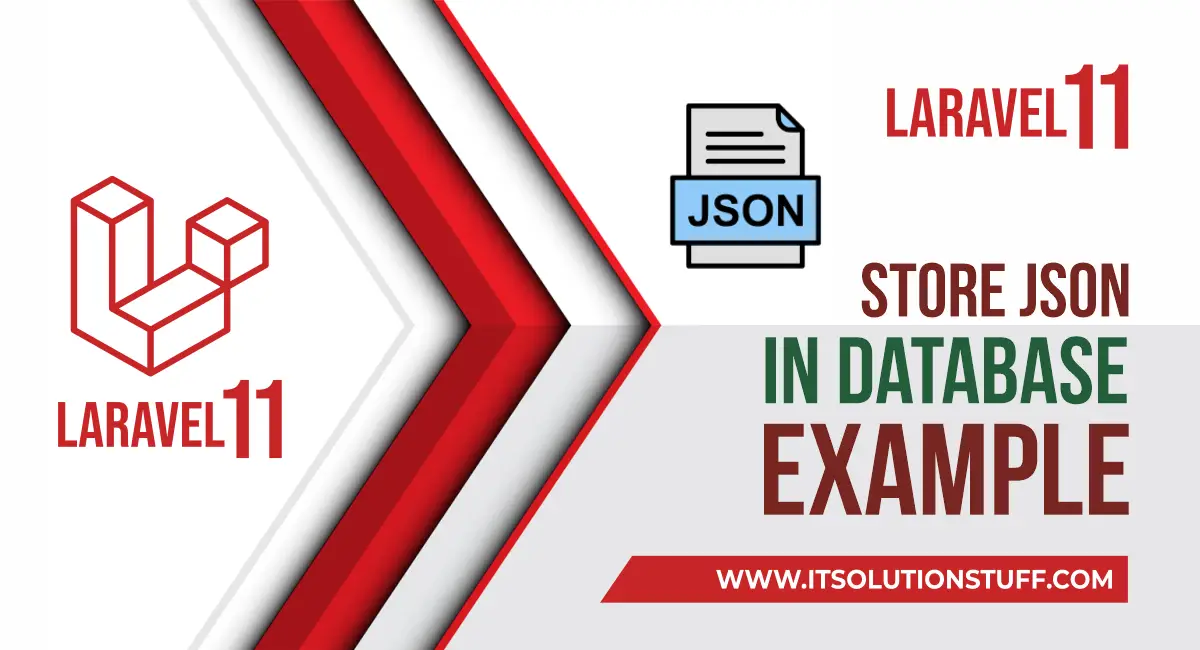Laravel 11 Store JSON Format Data in Database Tutorial
In this tutorial, I will show you how to store JSON data in database using laravel.
The $casts property in Laravel allows you to specify the data type of certain attributes of your model. When using $casts, Laravel automatically converts attributes between common data types, such as strings, integers, booleans, and JSON.
In this example, we will make a products table with two columns: name and details. The details column will use the JSON data type. Next, we will set up JSON casts for the details column in the Post model. After that, we will create a record and search for a record. Let's go through the steps to understand how it works.

Step for Laravel 11 Store JSON Data in Database Example
- Step 1: Install Laravel 11
- Step 2: Create Migration
- Step 3: Create Model
- Step 4: Create Route
- Step 5: Create Controller
- Run Laravel App: >
Step 1: Install Laravel 11
First of all, we need to get a fresh Laravel 11 version application using the command below because we are starting from scratch. So, open your terminal or command prompt and run the command below:
composer create-project laravel/laravel example-appStep 2: Create Migration
Here, we need to create a database migration for the "products" table with "name" and "details" (JSON Column) columns, and also we will create a model for the products table.
php artisan make:migration create_products_tabledatabase/migrations/2024_04_11_141714_create_products_table.php
<?php
use Illuminate\Database\Migrations\Migration;
use Illuminate\Database\Schema\Blueprint;
use Illuminate\Support\Facades\Schema;
return new class extends Migration
{
/**
* Run the migrations.
*/
public function up(): void
{
Schema::create('products', function (Blueprint $table) {
$table->id();
$table->string("name");
$table->json("details")->nullable();
$table->timestamps();
});
}
/**
* Reverse the migrations.
*/
public function down(): void
{
Schema::dropIfExists('products');
}
};
Then run the migration command to create the items table.
php artisan migrateStep 3: Create Model
In this step, we will create Product.php model with JSON casts. Let's create the model and update the following code:
php artisan make:model ProductApp/Models/Product.php
<?php
namespace App\Models;
use Illuminate\Database\Eloquent\Factories\HasFactory;
use Illuminate\Database\Eloquent\Model;
class Product extends Model
{
use HasFactory;
protected $fillable = [
'name', 'details'
];
protected $casts = [
'details' => 'json'
];
}
Step 3: Create Product
n the third step, we will create one route for testing to create new product with json data. So, create one route here.
routes/web.php
<?php
use Illuminate\Support\Facades\Route;
use App\Http\Controllers\ProductController;
Route::get('products/create', [ProductController::class, 'create']);
Now you can see the controller file code:
app/Http/Controllers/ProductController.php
<?php
namespace App\Http\Controllers;
use Illuminate\Http\Request;
use App\Models\Product;
class ProductController extends Controller
{
/**
* Write code on Method
*
* @return response()
*/
public function create()
{
$input = [
'name' => 'Gold',
'details' => [
'brand' => 'Jewellery',
'tags' => ['gold', 'jewellery', 'money']
]
];
return Product::create($input);
}
}
Now, you will see the following output:
{
"name": "Gold",
"details": {
"brand": "Jewellery",
"tags": [
"gold",
"jewellery",
"money"
]
},
"updated_at": "2024-09-12T13:12:44.000000Z",
"created_at": "2024-09-12T13:12:44.000000Z",
"id": 1
}
Step 3: Search Product
n the third step, we will create one route for testing to search product. So, create one route here.
routes/web.php
<?php
use Illuminate\Support\Facades\Route;
use App\Http\Controllers\ProductController;
Route::get('products/search', [ProductController::class, 'search']);
Now you can see the controller file code:
app/Http/Controllers/ProductController.php
<?php
namespace App\Http\Controllers;
use Illuminate\Http\Request;
use App\Models\Product;
class ProductController extends Controller
{
/**
* Write code on Method
*
* @return response()
*/
public function search()
{
$product = Product::whereJsonContains('details->tags', 'money')->get();
return $product;
}
}
Now, you will see the following output:
[
{
"id": 1,
"name": "Gold",
"details": {
"tags": [
"gold",
"jewellery",
"money"
],
"brand": "Jewellery"
},
"created_at": "2024-09-12T13:12:44.000000Z",
"updated_at": "2024-09-12T13:12:44.000000Z"
}
]
This way you can easily handle json data in laravel.
I hope it can help you...

